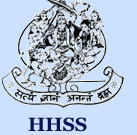|
 |
 |
History
of Hindu High School |

|
Opening of the Main block:
Unsaunted by the extreme steps taken by the department of Education
for insufficient accommodation, the committee made intense efforts
which resulted in the buying of adjoining sites and constructing
the main building on their combined sites at an estimated cost
of Rs. 57,627. The Government grant was only Rs. 19,209 towards
the building and the Committee had in hand only Rs. 16,000,
the amount accumulated by dint of hard saving during many years.
The late T.Namberumal Chetty, Contractor, who carried out the
construction of the building more as a matter of love than as
an item of profit-making business, has rightly earned the grateful
thanks of the Committee. This main building was opened in March
1897 by them Governor of Madras, Sir Arthur Havelock. (Proceedings
of this function are published elsewhere.) The name of the school
also was changed to "The Hindu High School". In 1906, again
another twelve rooms were added by erecting two floors on what
is now known as the northern block.
A
great loss:
In 1908, at a time when the guidance of Mr. M.A.Singarachariar
was further required, he passed away. Soon after his demise
the Committee thought of erecting a clock tower on the northern
side of the school as a fitting memorial to him but the idea
was given up. Then the hall which was on the first floor till
1942 was named after him at a function presided over by Sir
John Wallis, Chief Justice of Madras. No earthly memorial can
adequately express the indebtedness of the public to him. The
very school is a fitting memorial proclaiming silently but constantly
the services of Mr. M.A.Singarachariar, who led the way for
those interested in education.
Steady
growth of the school and further accommodation:
The good work done by great men continues to flourish even under
adverse circumstances. The school grew from strength to strength
and the public appreciated the benefit of education which the
school was giving. The Committee as and when additional accommodation
was needed, secured it by renting or buying. In 1920 it reconstructed
No.76,Big Street, securing thereby eight class rooms. In 1927
it purchased the opposite building No.40, Big Street at a cost
of Rs.15,100 and in 1938 house No. 41 was got y acquisition
at a cost of Rs. 5,736. Again in 1941, it gained twelve rooms
in the main building by adding a second floor to the northern
and southern blocks of the main building.
The original Singarachariar Hall in the first floor was is named
after him. This further accommodation which the school got in
the space of 6 months was entirely due to the ceaseless efforts
of Sri S.G.Srinivasachariar, who was the Secretary then. As
even this further accommodation was not sufficient, he had a
plan prepared in 1942 for the construction of about 20 rooms
on the site of the houses (No.40 and 41) opposite to the main
building. The Government on account of people after evacuation
the strength of the school again increased and the adequate
accommodation. It was at this time that the Government stopped
building grants to Boys' Schools. This unjust discrimination
existed till1948. Many schools which submitted building schemes
as early as 1942 had to suffer for want of adequate accommodation
and our school in particular was hard hit. The population of
Triplicane has been vastly increasing of late and the rush for
admission has consequently become greater.
The Corporation of Madras began to impose many restrictions
on the construction of buildings adjoining the streets. It was
found that a building scheme on the site of the opposite houses
as originally planned was impossible on account of the said
restrictions. On the advice of architects and engineers, attempts
were made to purchase the rented building west of the northern
quadrangle. As private negotiations failed, an application in
1946 was made to the Department of Education for the acquisition
of that site. A similar application was made at the same time
for the acquisition of two houses west of the southern quadrangle
for the extension of the playground. These two acquisition were
made by the Government for the school in 1950 and in 1949 and
the Committee had to pay Rs.85,230 for the former and Rs.13.470
for the latter. The Government were kind enough to give a grant
of Rs.35,000 for the firmer and Rs. 6,526 for the latter. In
1948, the Committee had to adopt the shift system of working
as a temporary expediency. Since then it has been making strenuous
efforts to find further accommodation. It was thought by the
Centenary Celebrations Committee that nothing could be more
fitting to commemorate the great occasion than the raising of
a three-storeyed building comprising 24 rooms. Immediate steps
were taken and the ground floor comprising eight rooms, the
construction of which began in June 1951, was completed by December
1951. Earnest attempts are being made to construct the first
and the second floors before july 1952 so that the shift system
may be given up at the beginning of the next academic year.
Money is required to achieve this object and it is hoped that
the alumni and the generous public would respond to the appeal
of the Centenary Celebrations Committee. |
|
|
